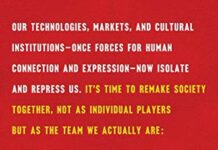
Ebook Info
- Published: 2017
- Number of pages: 304 pages
- Format: PDF
- File Size: 1.70 MB
- Authors: Douglas Rushkoff
Description
Why doesn’t the explosive growth of companies like Facebook and Uber deliver more prosperity for everyone? What is the systemic problem that sets the rich against the poor and the technologists against everybody else? When protesters shattered the windows of a bus carrying Google employees to work, their anger may have been justifiable, but it was misdirected. The true conflict of our age isn’t between the unemployed and the digital elite, or even the 99 percent and the 1 percent. Rather, a tornado of technological improvements has spun our economic program out of control, and humanity as a whole—the protesters and the Google employees as well as the shareholders and the executives—are all trapped by the consequences. It’s time to optimize our economy for the human beings it’s supposed to be serving. In this groundbreaking book, acclaimed media scholar and author Douglas Rushkoff tells us how to combine the best of human nature with the best of modern technology. Tying together disparate threads—big data, the rise of robots and AI, the increasing participation of algorithms in stock market trading, the gig economy, the collapse of the eurozone—Rushkoff provides a critical vocabulary for our economic moment and a nuanced portrait of humans and commerce at a critical crossroads.
User’s Reviews
Editorial Reviews: Review “Douglas Rushkoff is one of today’s most incisive media theorists and a provocative critic of our digital economy. He’s also fun to read.” —WALTER ISAACSON, president and CEO, The Aspen Institute, and author of The Innovators “If you don’t know Rushkoff, you’re not serious about figuring out what’s going to happen next.” —SETH GODIN, author of Linchpin “Thoughtful, provocative, and essential reading for our economic moment.” —JOI ITO, director, MIT Media Lab “We’ve optimized for growth. But have we lost our way? As an economy? As a community? As a society with a value proposition that doesn’t make sense on a human or economic level? Rushkoff asks questions that matter. A challenging and necessary read.” —SHERRY TURKLE, author of Reclaiming Conversation “Every great advance begins when someone sees that what everyone else takes for granted may not actually be true. Douglas Rushkoff questions the deepest assumptions of the modern economy and blazes a path toward a more human-centered world.” —TIM O’REILLY, founder, O’Reilly Media “Douglas Rushkoff is a true digital visionary. Read this rousing call to reboot our society from the bottom up before it’s too late.” —ASTRA TAYLOR, filmmaker and author of The People’s Platform “In what could be seen as a crisis, Rushkoff shares his smart, optimistic, and pragmatic perspective about how both businesses and consumers can reimagine today’s current economic operating system in the digital age—and prosper.” —BONIN BOUGH, chief media and e-commerce officer, Mondelēz“Powerful truth telling… The crux of the argument that Rushkoff makes is that the digital economy is a house of cards built on fictional growth metrics that drive companies to raise money, undercut human workers, sell on the public markets and then—almost inevitably—collapse under the weight of public market demands.” —Forbes “A brilliant, bomb-hurling critique of the flaws in our digital economy, identifying what has gone wrong and what can be done about it.” —Financial Times “A powerful exposé of an underdiscussed downside to the digital revolution.” —Kirkus Reviews About the Author Douglas Rushkoff is the bestselling author of Present Shock, as well as a dozen other books on media, technology, and culture, including Program or Be Programmed and Life Inc. Named one of the world’s ten most influential thinkers by MIT, he has made documentaries for PBS Frontline, including Generation Like and The Merchants of Cool, and he is a professor of media theory and digital economics at Queens College, CUNY. He lives in New York and lectures about media, society, and economics around the world.
Reviews from Amazon users which were colected at the time this book was published on the website:
⭐There is much to like and learn from this book, but it has some clear shortcomings too: it does not see the vitality of possibilities with near-future autonomous vehicles.Throwing Rocks at the Google Bus: How Growth Became the Enemy of ProsperityDouglas RushkoffLast accessed on Tuesday July 24, 2018I truly enjoyed this book, although in the beginning I didn’t think I would. Rushkoff focuses on what he calls “extractive capitalism” especially near- monopolies who use their power to grow incessantly (Reminds me of Amazon). This analogy to mining seemed right for many industries but raises some doubts in my mind about many service industries where service is really important. Planned parenthood certainly strives to grow, but there is no doubt that they provide a valuable service that many states already have curtailed beyond reason. But even Amazon was brilliant in its cloud strategy and devices like the Kindle and Alexa really improve the world. Even Google is transforming advertising dollars into self driving cars. Yes, this may become an 8 Trillion dollar industry but it will also reduce accidents dramatically, destroy the wasteful insurance industry, and reduce the demand for roads and gasoline. Rushkoff spends a good deal of his time denouncing the financial derivatives industry, but they too will automate finance in ways that will allow everyone to shares in productivity.The best part of Rushkoff’s analysis came out in his analysis of gigacompanies/unicorns and venture capital’s role in directing companies into gigantic payouts. Here he says: ““That’s why those firms usually demand a seat on the board of directors, from which they can steer company policy away from moderately successful outcomes and toward winner-takes-all conclusions. Most venture capitalists would rather drive a company into the ground than let it settle in as a sustainable operation. A s long as there is a chance, however small, for a company to become a billion-dollar supersuccess, the investor would rather push on. This means abandoning even surefire profit models if they aren’t going to generate the outlandish returns required by the venture capitalist’s overall portfolio strategy. He or she would prefer to let the company die, squeezing out every possible megawin, than let it carry on as a moderately successful enterprise. Without a major exit through acquisition or IPO, it is worthless on the level that venture capitalists are playing the game.”This has the ring of truth.As he says: “ Growth is the single, uncontested, core command of the digital economy.”Growth is much too important in our economy. We should focus much more on happiness, love, grace, care, and equality. Growth is too easily transformed into greed and lust for power. We need to balance it with fairness and a safety net for everyone: medical care for all, food and leisure for all. As I was sitting on the toilet today I heard a woman say she could not afford a home for her children. This is a travesty. How could we have billionaires who drop a billion for a yacht when children are not being given the essentials! It just makes no sense.He deals reasonably well with automation and jobs: quoting McAfee and Brynjolfsson, he explains. “Productivity is at record levels, innovation has never been faster, and yet at the same time, we have a falling median income and we have fewer jobs”. What he fails to explain is that the disruption will be enormous, but there is a pot of gold at the end of the rainbow. If we do things right, we will have Eden. If things go wrong, there will be a crushing dystopia with the wealthy elites in Nirvana and the rest of us dead.He has a great quote from Mill, but he does not seem to take it to heart: “Instead, Mill saw the end of growth concluding in what he called the “stationary state”—a sustainable equilibrium in which there would be “a well-paid and affluent body of labourers; no enormous fortunes, except what were earned and accumulated during a single lifetime; but a much larger body of persons than at present, not only exempt from the coarser toils, but with sufficient leisure, both physical and mental, from mechanical details, to cultivate freely the graces of life.”I take this to be a recognition that the need for labor will end; and in fact automation is bringing that to reality. However, our understanding of the value of human life has to shift, so that we value life on its own, not as work but as living. It is not clear that the elites have the empathy to do that, if our current crop of billionaires like Trump, Kochs, and their ilk are to be understood. But under their megalomania is the spark of empathy, as Gates, Buffet, and others demonstrate. Who will win?63. Matt Bruenig, “This One Weird Trick Actually Cuts Child Poverty in Half,” demos.org, July 21, 2014.4,42665. Anthony B. Atkinson, Inequality: What Can Be Done? (Cambridge, Mass.: Harvard University Press, 2015).4,45818. Beth Ann Bovino et al., “How Increasing Income Inequality Is Dampening Economic Growth, and Possible Ways to Change the Tide,” globalcreditreport.com, August 5, 2014.4,600John Stuart Mill, Principles of Political Economy with Some of Their Applications to Social Philosophy (London: Longmans, Green and Co., 1909), IV.6.2.mation.
⭐“How growth became the enemy of community”can also be phrased as,’How profit became the enemy of community.’Doug has a positive agenda: …we have the potential to move towards a much more functional, even compassionate economic system, favoring money flow over accumulation, which rewards people for creating value instead of [cleverly] extracting it. (p 10).Neither individuals, small businesses, corporations, nor even whole governments need to live [and value themselves in terms of] their rate of growth. … the sooner we accept this, the sooner we’ll all be off the hook. Then and only then will we be capable of ushering in the sort of economy [human beings] deserve. Ongoing, sustainable, and distributed prosperity is simpler than it sounds, and well within our reach. It can be our new normal (p 11).We are developing our new technologies not for the betterment of humanity; but, to maximize growth of the speculative [Wall Street] marketplace. It turns out these are not the same thing (p 6-7).Companies with new technologies are free to disrupt almost any industry they choose–journalism, television, music, manufacturing [taxicabs]–as long as they don’t disrupt the financial operating system churning beneath it all. …most of the founders of these digital companies don’t seem to realize this operating system even exists (p 7).[The competitive capitalist paradigm is] an extractive, growth-driven operating system which has reached the limits of its ability to serve anyone (p 4).By refusing to acknowledge the existence of this man-made landscape and our complicity in perpetuating it, we render ourselves incapable of [perceiving] beneath its surface (p 5).[Celebrating the latest new millionaire-billionaire on the first page of the Wall Street Journal is exactly analogous to what is done in gambling casinos to keep customers motivated to spend more. When a yokel wins big, the dealer proclaims, loudly enough for everyone to hear, “We have a big winner!”[Why? Because the player helps confirm the extractive, exploitive operating system of the casino, suggesting it’s valid and respectable. The same is true when the Wall Street Journal lauds digital billionaires whose products were virtual, whose company made little profit, who made their millions-billions by cashing out and selling their stock [close paraphrase from p 8]….digitally accelerated capitalism…is worsening the disparity between rich and poor, punishing those who actually work for a living, losing human control over the capital markets and letting shortsighted investors stifle long–term innovation (p 10).[The game is] beating the system instead of creative [real, truly human] value ( p 10)….we must accept the story of an infinitely expanding market for the myth it is (p 10).Reviewer HealingToolbox writes on BEst Practices in Energy Medicine http://www.amazon.com/Bruce-Dickson-MSS/e/B007SNVG46
⭐Similar themes to Paul Mason’s PostCapitalism, but with more solutions offered. For instance, suggests contributing value – to, say, platforms like Kindle Reviews – should result in a share of the value created, rather than the massive accumulation of wealth of platform owners.
⭐Douglas Rushkoff traces the phenomenon of growth as a necessary element of a modern economy back to the establishment of corporations and central currencies as instruments designed to extract value from local economies and deliver it to an investor class at which point value is converted into capital. Originally a means for the aristocracy to reassert itself against a rising middle class and markets,and to become the investors in those markets (at the price of interest on loans and payment for central currencies), the system functioned for as long as there was sufficient friction in market economies to obstruct the efficiency of value extraction by the investor class. The rise of a digital economy is succeeding in reducing friction to the point where value is being extracted at a rate which is now impoverishing even corporations whose profits are increasingly accumulating in capital held by shareholders and not in assets held by them. At the root of the problem is the the necessity of growth required to finance and re-finance systemic and ever-increasing debt which is exacerbated by the rise of a digitized financial sector operating like a massive video game engaged in post-human algorithmic warfare to extract value from every transaction, autonomously gaming every move to create new, novel, incremental opportunities for gain. Nonetheless, Rushkoff sees opportunity in the rise of a digital sensibility, in that the economy and the power structures it has engendered lend themselves to a new kind of analysis through the eyes of “coders” accustomed to analyzing, redesigning and debugging complex systems and networks. Rushkoff examines alternatives to the current knowledge economy with its market-driven tendencies towards monopolies and limited alternatives in a technological environment eminently capable of delivering plenitude, variety and peer-to-peer goods and services. All in all, a thorough, well-written dissemination of a complex subject dealt with historically, socially, technically and aesthetically with a minimum of political or ideological commentary, rendering it accessible to anyone interested in these issues.
⭐Interesting insider view of the high tech world of Silicon valley and the power of money, but slides into a whiny rant about the failure of companies and developers to preserve the purity of the Internet. The idealistic belief that the Internet could be some form of digital utopia, while an an admirable goal, reveals a lack of understanding about the actual origins of the Internet. The idea to link mainframe computers came from big universities and DARPA, a military research organization. It was brought to the public by the biggest telecom companies. There was a great deal of naive optimism about the Internet in the early days, but these groups have a vested interest in capitalism and the continuity of the existing social order. Can the Internet be used for social justice? Absolutely, but it can also be used to coordinate terrorist attacks. The moral outrage of the writer is apparent and the problems he identifies are real, but this does not substitute for careful analysis. Ultimately, his argument is that people have done bad things and they should stop.
⭐The people in any type of power who should be listening to this are deaf and blind. If dissent, protests, demonstrations, strikes etc. had been truly effective in last hundred years, we would not have such an ugly world to pass on to the next generation, who are victims of our sins. Sounds fatalistic? But to me it’s true.
⭐I really enjoyed this book and was a little disappointed when it ended. I hope the author writes another book geared towards practical aspects of distributed economiesI had a friend/coworker at Google in 2013 who arrived at work one morning a little upset when her Google bus had been stopped by demonstrators. This bit of history is the lead off for this book but for me the most valuable part of the book was understanding how centralized powers extract value from local producers, and how historically this started at the end of the Dark Ages.
Keywords
Free Download Throwing Rocks at the Google Bus: How Growth Became the Enemy of Prosperity in PDF format
Throwing Rocks at the Google Bus: How Growth Became the Enemy of Prosperity PDF Free Download
Download Throwing Rocks at the Google Bus: How Growth Became the Enemy of Prosperity 2017 PDF Free
Throwing Rocks at the Google Bus: How Growth Became the Enemy of Prosperity 2017 PDF Free Download
Download Throwing Rocks at the Google Bus: How Growth Became the Enemy of Prosperity PDF
Free Download Ebook Throwing Rocks at the Google Bus: How Growth Became the Enemy of Prosperity




